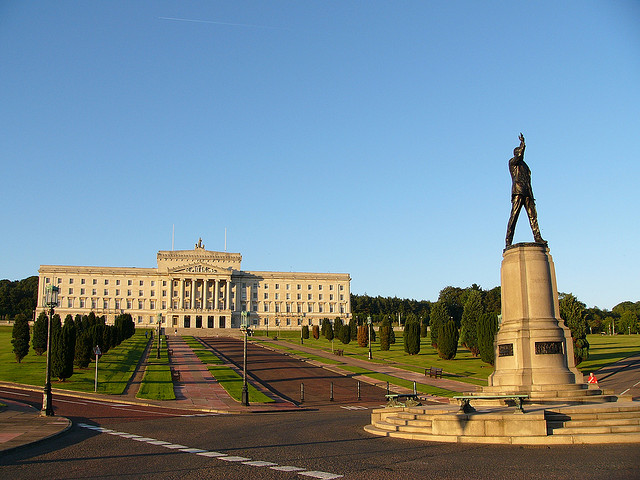Northern Ireland desperately needs a deliberative model to prevent it becoming a dictatorship of electoral democracy
Simon Burall of Involve, a think tank specialising in democracy and public engagement, recently authored a new report entitled ‘Room for a View’, which focusses on the idea of UK democracy as a deliberative process. Paul Braithwaite welcomes the report’s insights and argues a deliberative model is urgently needed in Northern Ireland. He writes that the repetitive cycle of institutional crisis legitimated by zero-sum elections is a dangerous game that can only go on for so long.
“Every party sees every issue as a political opportunity. There is this obsession with electoral politics alone. Electoral democracy has actually become anti-democracy. Electoral politics has become obscene”
This quote is actually about India – drawn from an article about the politics around recent sectarian violence. But it would resonate with many people in Northern Ireland too.
Political negotiations to save our devolved institutions are ongoing at Stormont again and, as usual, the doors are firmly locked and the public kept in the dark. We’ll be informed after the event of what has been agreed on our behalf. After all, we elected the people in that room so we’ve no need to have a direct say. So goes the logic of democracy in Northern Ireland.
As the ‘Room for a View’ report points out, electoral democracy rests on the “fundamentally false assumption that elections allow voters to make their preferences clear”.
In Northern Ireland we have the added dimension of identity-based voting undermining this even further. It’s not that the people of Northern Ireland don’t care about health, education or the economy – they hold views as strongly on these subjects as citizens anywhere else – it’s simply that the fear-mongering and tribal manipulations our politicians have used for decades as a method of popular control mean that elections are presented as an almost existential choice.
It’s not all bad news, some aspects of our devolved institutions could actually be perceived as ahead of the rest of the UK – the proportional representation voting system and comparatively strong scrutiny function of the NI Assembly’s committee system being two such examples.
Other than these exceptions however, it is likely that an assessment of NI’s democratic health across the seven components set out in ‘Room for a View’ would paint a fairly bleak picture.
The health of civil society in its role as a check and balance on the exercise of Executive power is one particular area of concern. Northern Ireland has a vibrant and diverse voluntary, community and social enterprise (VCSE) sector. During the long years of violent conflict it stood as a bulwark against the mayhem on the streets and was instrumental in bringing about the long sought after peace. This crucial role was temporarily acknowledged through the establishment of the Civic Forum as part of the Good Friday Agreement, but this has been in suspension since 2007.
Civic Forum aside however, civil society has arguably struggled to reconfigure its role in the peace era to one of challenging and holding accountable the institutions it helped create. Furthermore – as with other parts of the UK and beyond – changed funding patterns, especially a shift to public procurement, have driven the sector increasingly down the road of public service delivery with the attendant impacts on its independence.
We desperately need a more deliberative model of democracy – the repetitive cycle of institutional crisis legitimated by zero-sum elections is a dangerous game that can only go on so long.
We at Building Change Trust are seeking to address some individual components of the deliberative systems framework through our work on Civic Activism, Open Government and our research on VCSE sector independence. There are many others doing likewise – the Carnegie Roundtable on Wellbeing, 2014’s Make It Work campaign, and the recently announced Civil Society Network for example.
However the deliberative systems framework set out in ‘Room for a View’ provides an excellent added opportunity for all of us to reflect on our work in the context of the democratic system as a whole.
—
This blog was written in response to the launch of the report Room for a View by Involve’s director Simon Burall. Read the full report and follow Involve on Twitter. It represents the views of the author and not those of Democratic Audit UK, or the LSE. Please read our comments policy before posting.
—
 Paul Braithwaite is Development & Implementation Officer at the Building Change Trust.
Paul Braithwaite is Development & Implementation Officer at the Building Change Trust.






 Democratic Audit's core funding is provided by the Joseph Rowntree Charitable Trust. Additional funding is provided by the London School of Economics.
Democratic Audit's core funding is provided by the Joseph Rowntree Charitable Trust. Additional funding is provided by the London School of Economics.
[…] Paul Braithwaite, Building Change Trust, Northern Ireland […]
[…] Visit the site […]
Northern Ireland desperately needs a deliberative model to prevent it becoming a dictatorship of electoral democracy https://t.co/aUUNDg7Qxg
Northern Ireland desperately needs a deliberative model to prevent it becoming a dictatorship of electoral democra… https://t.co/KQvq8Td4D6
Northern Ireland desperately needs a deliberative model to prevent it becoming a… https://t.co/JmGZNv9O8w https://t.co/DGl6N6PlXa